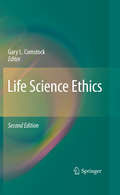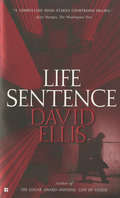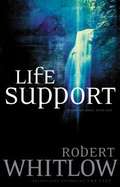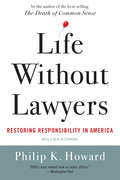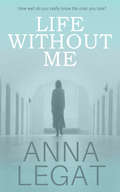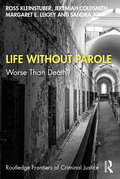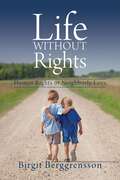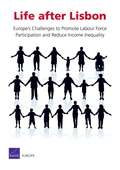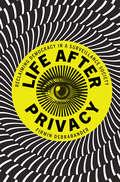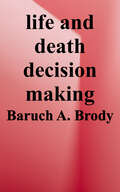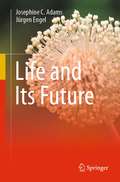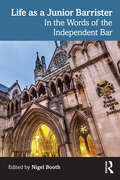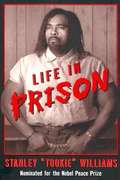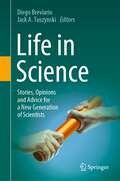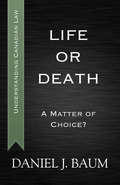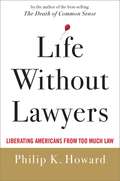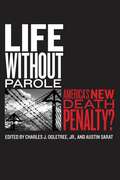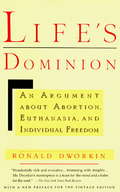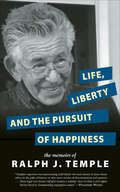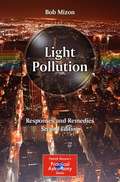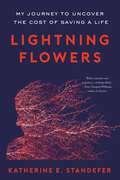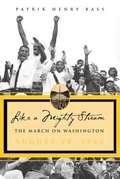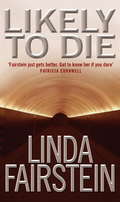- Table View
- List View
Life Science Ethics
by Gary L. ComstockDoes nature have intrinsic value? Should we be doing more to save wilderness and ocean ecosystems? What are our duties to future generations of humans? Do animals have rights? This revised edition of "Life Science Ethics" introduces these questions using narrative case studies on genetically modified foods, use of animals in research, nanotechnology, and global climate change, and then explores them in detail using essays written by nationally-recognized experts in the ethics field. Part I introduces ethics, the relationship of religion to ethics, how we assess ethical arguments, and a method ethicists use to reason about ethical theories. Part II demonstrates the relevance of ethical reasoning to the environment, land, farms, food, biotechnology, genetically modified foods, animals in agriculture and research, climate change, and nanotechnology. Part III presents case studies for the topics found in Part II.
Life Sentence
by David EllisMore information to be announced soon on this forthcoming title from Penguin USA.
Life Support (Santee Series, Book #1)
by Robert WhitlowAlexia Lindale knows her new case is a matter of life and death. She doesn't have a clue what it will do to her heart. . . and soul. From the Christy-award-winning author of The List, The Trial, and The Sacrifice comes this twisting tale of tough decisions, mixed motives, and mysterious, healing grace. Baxter Richardson survived a fall from a cliff while hiding in the mountains. Whether he'll make it through the next few weeks is unclear. His survival depends on the machines that help him breathe. On the haunted, unstable wife who wants to pull the plug and hide her secrets. On the doting father who wants him alive for reasons of love and money. On the conflicting legal documents that send the fight to court. And, on the music and prayers of an extraordinarily gifted pianist.
Life Without Lawyers: Restoring Responsibility in America
by Philip K. HowardHow to restore the can-do spirit that made America great, from the author of the best-selling The Death of Common Sense. Americans are losing the freedom to make sense of daily choices--teachers can't maintain order in the classroom, managers are trained to avoid candor, schools ban tag, and companies plaster inane warnings on everything: "Remove Baby Before Folding Stroller." Philip K. Howard's urgent argument is full of examples, often darkly humorous. He describes the historical and cultural forces that led to this mess and lays out the basic shift in approach needed to fix it. Today we are flooded with legal threats that prevent us from taking responsibility. We must rebuild boundaries of law that protect an open field of freedom. The voices here will ring true to every reader. The analysis is powerful, and the solution unavoidable. What's at stake, Howard explains in this seminal book, is the vitality of American culture.
Life Without Me
by Anna LegatA darkly and brilliantly funny look at what being a fly on the wall is really like, Life Without Me is Anna Legat’s debut novel.Georgie Ibsen is a successful, cynical, fortysomething hotshot lawyer. She runs her life, professional and personal, with precision and clear purpose. She’s just made a breakthrough in a crucial case, her family is growing more independent … things couldn’t be better.Until it all comes to a screeching halt when she’s involved in a hit-and-run and ends up in a coma.Somehow, in her comatose state, Georgie is given unique glimpses into the lives of her nearest and dearest, their most intimate secrets: her boring husband’s intense involvement with a colleague; her son’s lovelorn yearning for his mother’s nurse; her fifteen-year-old daughter’s bad boy boyfriend, who just might be linked to the criminal mastermind involved in her last big case…Throw in a neurotic actress sister, a senile mother with a traumatic past, and a smug subordinate barrister who’s out to ruin her case in her absence…oh, and a sex-god lawyer extraordinaire who’s a deeply troubled soul with a penchant for some unsavoury practices…although Georgie is out of action, life certainly isn’t boring without her!
Life Without Parole: Worse Than Death? (Routledge Frontiers of Criminal Justice)
by Margaret E. Leigey Ross Kleinstuber Jeremiah Coldsmith Sandra JoyThis book is an in-depth critical examination of all pertinent aspects of life without parole (LWOP). Empirically assessing key arguments that advance LWOP, including as an alternative to the death penalty, it reveals that not only is the punishment cruel while not providing any societal benefits, it is actually detrimental to society. Over the last 30 years, LWOP has exploded in the United States. While the use of capital punishment over that same time period has declined, it must be recognized that LWOP is, in fact, a hidden death sentence. It is, however, implemented in a way that allows society to largely ignore this truth. While capital punishment has rightfully been subject to intense debate and scholarship, LWOP has mostly escaped such scrutiny. In fact, LWOP has been touted by both death penalty abolitionists and by tough-on-crime conservatives, which has allowed it to flourish under the radar. Specifically, abolitionists have advanced LWOP as a palatable alternative to capital punishment, which they perceive as inhumane, error-prone, costly, and racially biased. Conservatives, meanwhile, advocate for LWOP as an effective means of fighting crime, a just form of retribution, and necessary tool for managing incorrigible offenders. This book seeks to tap into and help inform this growing debate by subjecting these key arguments to empirical scrutiny. The results of those analyses fail to produce any evidence in support of any of those various justifications and therefore suggest that LWOP should be abolished and replaced with life sentences that come with parole eligibility after a maximum of 25 years. The book will be of great interest to students and scholars of criminology and criminal justice and will also have crossover appeal into the fields of law, political science, and sociology. It will also appeal to criminal justice professionals, lawmakers, activists, and attorneys, as well as death penalty abolitionists, opponents of mass incarceration, advocates for sentencing reform, and supporters of prisoners’ rights.
Life Without Rights: Human Rights or Neighborly Love
by Birgit BerggrenssonThe topic of the book is the focus on rights, which has spread like wildfire above all in the Western part of the world since the Second World War and the impact this way of thinking has had on how we see our fellow human beings. The author sees rights fo
Life after Lisbon
by Stijn Hoorens Priscillia Hunt Christian Van Stolk Flavia Tsang Philipp-Bastian BrutscherThe economic crisis of 2008 has undone much of the progress on improving employment and growth in Europe. The review concludes that policy makers should focus on enabling social policy that allows individuals to achieve their productive potential.
Life after Privacy: Reclaiming Democracy in a Surveillance Society
by Firmin DeBrabanderPrivacy is gravely endangered in the digital age, and we, the digital citizens, are its principal threat, willingly surrendering it to avail ourselves of new technology, and granting the government and corporations immense power over us. In this highly original work, Firmin DeBrabander begins with this premise and asks how we can ensure and protect our freedom in the absence of privacy. Can—and should—we rally anew to support this institution? Is privacy so important to political liberty after all? DeBrabander makes the case that privacy is a poor foundation for democracy, that it is a relatively new value that has been rarely enjoyed throughout history—but constantly persecuted—and politically and philosophically suspect. The vitality of the public realm, he argues, is far more significant to the health of our democracy, but is equally endangered—and often overlooked—in the digital age.
Life and Death Decision Making
by Baruch A. BrodyIntegrating theory with realistic case studies, this book examines the practical application of moral theory in clinical decision-making. With forty composite cases based on actual clinical experiences, the author describes key moral problems raised by modern medicine. <p><p>He then demonstrates how these dilemmas can be resolved using a problem-solving framework termed pluralistic casuistry. This approach is pluralistic in that it accepts the relevance of many different moral grounds, drawn from different traditional moral theories, each of which may seem self-contained and hence in conflict with other claims. <p><p>Consequently, the author stresses the need to achieve a synthesis of these traditional moral theories, rather than treating them as competitors. His approach is casuistrical in the sense that it considers the important differences between the cases at issue and applies the different moral appeals in different ways. The richly detailed case studies will challenge readers, clarify the ethical issues involved, and indicate how theory and practice can be integrated. Containing a multiplicity of factors faced in clinical crises, they are ideal for group discussions concerning the ways in which theory relates to actual life-or-death situations.
Life and Its Future
by Jürgen Engel Josephine C. AdamsThis book is aimed at those who wish to understand more about the molecular basis of life and how life on earth may change in coming centuries. Readers of this book will gain knowledge of how life began on Earth, the natural processes that have led to the great diversity of biological organisms that exist today, recent research into the possibility of life on other planets, and how the future of life on earth faces unprecedented pressures from human-made activities. Readers will obtain a perspective on the potential risks of chemical or nuclear warfare, and the ever-increasing risks from human activities that are causing pollution and climate change with global heating. Readers will also learn about ongoing research efforts to generate “designer lifeforms” through synthetic biology and applications of artificial intelligence. The book makes an integrated, up-to-date, overview of topics often considered as separate fields. It should be valuable to students, teachers, and people who are concerned about the future of life.
Life as a Junior Barrister: In the Words of the Independent Bar
by Nigel BoothThis essential volume for all aspiring barristers offers guidance, insights and advice from new barristers from a diverse range of backgrounds and practice areas, shedding light on what life is really like for barristers at the independent Bar. Each chapter is candid and honest about the reality of the Bar and how it measures against student expectations. There is only one Bar, but working in different practice areas brings different challenges. This book brings together new practitioners from across the disciplines, from crime to commercial, from family to employment law, and more, as they each discuss their workloads, the sorts of cases and tasks that they typically face and highlight the skills which need to be developed in the first couple of years. Practical tips around time-management and finance feature, as well as advice around key social and cultural issues. The concluding chapter by Jaime Hamilton QC discusses the transformations that the Bar has undergone and continues to go through. Accessible and engaging, this invaluable resource is the perfect guide for anyone interested in exploring a career at the Bar. It will be an ideal companion to students of law at any level.
Life in Prison: Stanley Tookie Williams
by Barbara BecnelStanley "Tookie" Williams, cofounder of the notorious Crips gang, is a death-row inmate. But in his two decades of incarceration, Williams has also become a respected author and activist whose dedication to ending gang warfare in the lives of inner-city children has earned him a 2001 Nobel Peace Prize nomination. In this award-winning book, which has drawn praise from educators, government leaders, and families alike. Williams describes the brutal reality of being an inmate. He debunks myths of prisons as "gladiator schools" with blunt, riveting stories of overwhelming homesickness, the terror of solitary confinement, and the humiliation of strip-searches. Williams' words are a frank challenge to adolescent listeners to educate themselves, make intelligent decisions, and above all, not to follow in his footsteps.
Life in Science: Stories, Opinions and Advice for a New Generation of Scientists
by Jack A. Tuszynski Diego BreviarioThis book is a collection of stories, reflections and advice written by proficient scientists. They address the question of what doing science means to them, and describe attitudes and working practices that have proved effective and rewarding. The book is aimed in particular at young people who are attracted by science or already undertaking undergraduate studies, and who are considering making science their long-term profession. It will also be helpful and revealing to early-career scientists who are searching for their own best route to success. The book serves as a platform for experienced scientists to describe their original inclination, how that subjective disposition found its expression in their way of doing science, whether their expectations were met, and what achievements they can claim. But it is not restricted to success: contributors also share details of the limitations and failures they have encountered. Last but not least they describe how they see science now, how they think it will be in the near future, and what advice they would give to the their much younger colleagues. Readers will appreciate the diversity of the individual paths shaped by different education, motivation, ambition, inclination, intuition, feeling, belief and eligibility. At the same time the stories confirm that science relies on a translation of this subjective level into an objective level, one that is shared and accepted by the international scientific community, and whose results are produced with a commonly accepted and fully rational scientific method of investigation.
Life or Death
by Daniel J. BaumA understandable overview of the laws regarding euthanasia, end-of-life treatment, and medication of those who may be unable to decide for themselves if the treatment is necessary. <p><p> Our bodies are ours to control, free from state interference — or so it appears. The Charter of Rights and Freedoms provides: “Everyone has the right to life, liberty and security of the person and the right not to be deprived thereof except in accordance with the principles of fundamental justice.” <p> But, how absolute is this? Do parents have the final decision in determining the medical care of their children, even if that choice may mean death? May children override the choices of their parents as to medical care? What role, if any, does the state (or the courts) have in reviewing individual medical choices, even if those choices are made by an adult but could result in death? Can physicians insist that their patients must have certain medical treatments? Do the terminally ill have the right to ask for assistance in dying? <p> These are among the questions upon which Canadian judges must rule. When and how they reach decisions are explored in Life or Death: A Matter of Choice?
Life without Lawyers: Liberating Americans from Too Much Law
by Philip K. HowardSupported by powerful, urgent and elegant arguments with humorous examples and unavoidable solutions, Howard explains in this seminal book, the vitality of American culture--the freedom to make sense of daily choices, and suggests the need for basic shift in approach to fix the mess created by the historical and cultural forces.
Life without Parole: America's New Death Penalty? (The Charles Hamilton Houston Institute Series on Race and Justice #1)
by Charles J. Ogletree Jr. Austin SaratIs life without parole the perfect compromise to the death penalty? Or is it as ethically fraught as capital punishment? This comprehensive, interdisciplinary anthology treats life without parole as “the new death penalty.” Editors Charles J. Ogletree, Jr. and Austin Sarat bring together original work by prominent scholars in an effort to better understand the growth of life without parole and its social, cultural, political, and legal meanings. What justifies the turn to life imprisonment? How should we understand the fact that this penalty is used disproportionately against racial minorities? What are the most promising avenues for limiting, reforming, or eliminating life without parole sentences in the United States? Contributors explore the structure of life without parole sentences and the impact they have on prisoners, where the penalty fits in modern theories of punishment, and prospects for (as well as challenges to) reform.
Life's Dominion: An Argument About Abortion, Euthanasia, and Individual Freedom
by Ronald DworkinOne of the country's most distinguished scholars presents a brilliantly original approach to the twin dilemmas of abortion and euthanasia, showing why they arouse such volcanic controversy and how we as a society can reconcile our values of life and individual liberty.
Life, Liberty and the Pursuit of Happiness
by Ralph J. TempleA memoir from one of the country&’s top civil rights lawyers—from his work with Dr. Martin Luther King, Jr. through his career at the ACLU. This volume comprises Ralph J. Temple&’s memoirs of his life and his work on behalf of the poor and disadvantaged. After graduating from Harvard Law School in 1956, Temple worked for Thurgood Marshall at the NAACP Legal Defense Fund until he was drafted into the United States Army. A critical formative experience was Temple&’s August 1964 trip to St. Augustine, Florida, with the New York City Lawyers Constitutional Defense Fund, where he worked with Dr. Martin Luther King, Jr. and others to ensure compliance with the newly enacted 1964 Civil Rights Act. Finding his calling as a civil rights and civil liberties attorney, Temple rose to the position of Legal Director of the ACLU of the National Capital Area in Washington, DC, where he served from 1966–80. During his tenure there, he established himself in Washington as a lion ready to fight (and win) across a broad array of free speech issues. In 2008, the DC ACLU presented him with their annual Alan and Adrienne Barth Award for Exemplary Volunteer Service. Temple kept up his legal activism and civic organizing in Oregon (where he relocated in 1996), until the day he passed away on August 27, 2011. On September 18, 2011, he was recognized by the ACLU Foundation of Oregon for his brilliant and tireless work on behalf of civil liberties. &“These legal war stories will give readers a realistic view of what a civil rights lawyer faced in championing unpopular causes.&” —Publishers Weekly
Lifetime Disadvantage, Discrimination and the Gendered Workforce
by Susan Malcolm Sargeant Bisom-RappLifetime Disadvantage, Discrimination and the Gendered Workforce fills a gap in the literature on discrimination and disadvantage suffered by women at work by focusing on the inadequacies of the current law and the need for a new holistic approach. Each stage of the working life cycle for women is examined with a critical consideration of how the law attempts to address the problems that inhibit women's labour force participation. By using their model of lifetime disadvantage, the authors show how the law adopts an incremental and disjointed approach to resolving the challenges, and argue that a more holistic orientation towards eliminating women's discrimination and disadvantage is required before true gender equality can be achieved. Using the concept of resilience from vulnerability theory, the authors advocate a reconfigured workplace that acknowledges yet transcends gender.
Light Pollution: Responses and Remedies (The Patrick Moore Practical Astronomy Series)
by Bob MizonThere have been many developments in the field of light pollution over the last few years, and this second edition of 'Light Pollution - Responses and Remedies' will introduce them in detail. Examples include the appearance of anti-light pollution legislation in various countries, new departures in lighting design, human health implications, and the growing realization among the general public that lighting is not always a good thing. In this title, author Bob Mizon discusses the various ways in which wasted artificial light has damaged the quality of modern life, and suggest solutions. This book is for anyone who has experienced glare, discomfort, or nuisance from poorly directed lights; has wondered why we waste so much money lighting the sky; or anyone who simply wants to see the stars instead of a baleful urban glow. "Light Pollution, 2nd Edition" offers practical and inexpensive solutions to the world-wide problem of wasted artificial light, and emphasizes that light pollution is not just an astronomers' problem, but affects everyone in various ways.
Lightning Flowers: My Journey to Uncover the Cost of Saving a Life
by Katherine E. StandeferLightning Flowers weighs the impact modern medical technology has had on the author's life against the social and environmental costs inevitably incurred by the mining that makes such innovation possible — &“utterly spectacular.&” (Rachel Louise Snyder, author of No Visible Bruises) What if a lifesaving medical device causes loss of life along its supply chain? That's the question Katherine E. Standefer finds herself asking one night after being suddenly shocked by her implanted cardiac defibrillator. In this gripping, intimate memoir about health, illness, and the invisible reverberating effects of our medical system, Standefer recounts the astonishing true story of the rare diagnosis that upended her rugged life in the mountains of Wyoming and sent her tumbling into a fraught maze of cardiology units, dramatic surgeries, and slow, painful recoveries. As her life increasingly comes to revolve around the internal defibrillator freshly wired into her heart, she becomes consumed with questions about the supply chain that allows such an ostensibly miraculous device to exist. So she sets out to trace its materials back to their roots. From the sterile labs of a medical device manufacturer in southern California to the tantalum and tin mines seized by armed groups in the Democratic Republic of the Congo to a nickel and cobalt mine carved out of endemic Madagascar jungle, Lightning Flowers takes us on a global reckoning with the social and environmental costs of a technology that promises to be lifesaving but is, in fact, much more complicated. Deeply personal and sharply reported, Lightning Flowers takes a hard look at technological mythos, healthcare, and our cultural relationship to medical technology, raising important questions about our obligations to one another, and the cost of saving one life.
Like a Loaded Weapon: The Rehnquist Court, Indian Rights, and the Legal History of Racism in America (Indigenous Americas)
by Robert Williams Jr.Robert A. Williams Jr. boldly exposes the ongoing legal force of the racist language directed at Indians in American society. Fueled by well-known negative racial stereotypes of Indian savagery and cultural inferiority, this language, Williams contends, has functioned “like a loaded weapon” in the Supreme Court’s Indian law decisions. Beginning with Chief Justice John Marshall’s foundational opinions in the early nineteenth century and continuing today in the judgments of the Rehnquist Court, Williams shows how undeniably racist language and precedent are still used in Indian law to justify the denial of important rights of property, self-government, and cultural survival to Indians. Building on the insights of Malcolm X, Thurgood Marshall, and Frantz Fanon, Williams argues that racist language has been employed by the courts to legalize a uniquely American form of racial dictatorship over Indian tribes by the U.S. government. Williams concludes with a revolutionary proposal for reimagining the rights of American Indians in international law, as well as strategies for compelling the current Supreme Court to confront the racist origins of Indian law and for challenging bigoted ways of talking, thinking, and writing about American Indians. Robert A. Williams Jr. is professor of law and American Indian studies at the James E. Rogers College of Law, University of Arizona. A member of the Lumbee Indian Tribe, he is author of The American Indian in Western Legal Thought: The Discourses of Conquest and coauthor of Federal Indian Law.
Like a Mighty Stream: The March on Washington, August 28, 1963
by Patrik Henry BassThe March on Washington for Jobs and Freedom, held in the nation's capital on August 28, 1963, is recognized as a watershed moment in American history. It was epochal; one of the most significant events of the 20th century. The New York Times called the March "the greatest assembly ever seen." No public event before or since has had the social, cultural or political impact of The March on Washington for Jobs and Freedom. ... This is a retrospective illumination of the events that led to the March. The book zeroes in on the leaders who made it happen, and explores the impact it had on the people who attended. ... Bass integrates the remembrances of everyday and extraordinary Americans who attended, including NPR correspondent Vertamae Grosvenor, Georgia representative Nan Grogan Orrock, and 60 Minutes correspondent Ed Bradley, Jr. Their memories of the day widely differ. Some recall the day as one of the hottest of their lives; others thought it was a mild summer day. There are varying accounts of how many people attended, and there are differences about the progress that was and has been made... Where they agree is that this was one of the greatest days in American history: an unparalleled celebration of humanity and hope.
Likely To Die (Alexandra Cooper #2)
by Linda FairsteinAlexandra Cooper, Manhattan's top sex crimes prosecutor, is brought into what promises to be a messy case. Gemma Dogen was found in her own office in a New York hospital sexually assaulted, soaked in her own blood and considered likely to die before she can be moved to the emergency room.Alex combs through her files for murders with similar modus operandi, while Mike Chapman and the other detectives concentrate on possible motives amongst her friends and colleagues - many of whom had found Gemma a professional thorn in their sides.Two facts rapidly become apparent: the hospital itself is far from secure; and someone believes that Alex has discovered something far too damaging for them to let her live...
